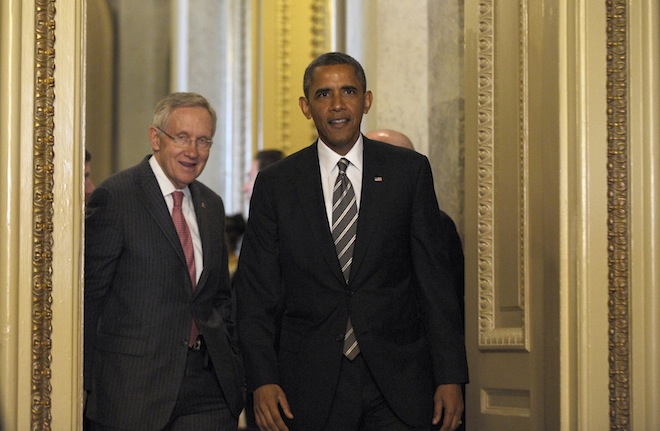Congress capped off a tense and exhausting day Wednesday with back-to-back Senate and House votes on a bill to re-open the shuttered government through Jan. 15 and prevent a catastrophic default on the country’s debt until at least Feb. 7.
And yet, scores of lawmakers were already expressing concerns about a replay of the damaging showdown — in just a few months.
“We should be concerned,” said Sen. Tim Scott (R-SC). “Definitely.”
“Well, we’ll see, won’t we?” sighed Sen. Bob Corker (R-TN). “You know, the environment that we’re in here is — well, it is what it is. … There’s an old adage: ‘There’s nothing to be learned from the second kick of a mule.’ So maybe there’s been a little bit of education. We’ll see.”
The Senate voted 81-18 shortly after sunset. Then the House voted 285-144, with the entirety of the opposition coming from Republicans, and Democrats carrying it to the finish line. The writing was on the wall by the morning and GOP lawmakers spent the day resigning themselves to the coming surrender — just one day ahead of the debt limit deadline — after demanding a king-size ransom for averting economic disaster.
Across the Capitol, TPM asked Rep. Peter King (R-NY) if conservative members have learned their lesson about picking dead-end fights like defunding Obamacare. He paused, then laughed and said, “Uh, I don’t know. Hope springs eternal. I don’t know.”
There was also little optimism to be found about the upcoming budget conference yielding an agreement by the Dec. 13 deadline to resolve the sharp disputes that have plagued Washington for years. Senate Budget Chair Patty Murray (D-WA) said she was having breakfast Thursday morning with House Budget Chair Paul Ryan (R-WI) to kick things off.
“I just don’t know [if we’ll reach a deal],” Ryan told TPM in a gaggle with reporters Wednesday. “We’ll see. I’ve made it no secret that I want to get a budget agreement that gets entitlement spending under control, that gets a dent on the debt and gets pro-growth policies to create jobs. Nothing has changed from my perspective.”
Ryan made clear he’s not interested in new tax revenues, without which President Barack Obama and Democrats have promised not to replace the automatic spending cuts known as sequestration — which both sides dislike — or touch Medicare or Social Security.
“It’s challenging these days,” said Senate Finance Chair Max Baucus (D-MT). “Tax reform, entitlement reform, potentially deal with sequestration — it’s going to be difficult. But we have no choice but to try.”
“Eh, not particularly [optimistic],” Sen. John McCain (R-AZ) said of the prospects of a budget deal. “It’s a good thing to do. It’s a good start.”
The agreement, negotiated by Senate Majority Leader Harry Reid (D-NV) and Minority Leader Mitch McConnell (R-KY), shunned the wishes of House Republicans after their efforts to settle on their own proposal flamed out Tuesday and forced Speaker John Boehner (R-OH) to bring it up for a vote.
“This is a hard blow to the Republican Party,” McCain told reporters.
The bill now goes to Obama, who strongly supports it and has pledged to sign it into law.
Rep. Devin Nunes (R-CA), a conservative who has been critical of the hard right “lemmings” who shut down the government over Obamacare, lamented to TPM that they have “probably not” learned their lesson when it comes to picking self-defeating fights.
The government shutdown has cost the U.S. economy $24 billion, according to estimates. It will shut down again on Jan. 15 if Congress doesn’t act on a new funding measure by then. And the debt limit will need to be raised likely in March given the extraordinary measures the bill permits to borrow beyond the nominal Feb. 7 deadline.
For all the lack of optimism, there were signs of “hope” among lawmakers who don’t want to close any doors so soon. “My hope,” said Murray, “is that in the weeks and months ahead we can heal many of the partisan divides that keep us from addressing the big challenges we face, including returning our focus to creating jobs and improving our economy.”






